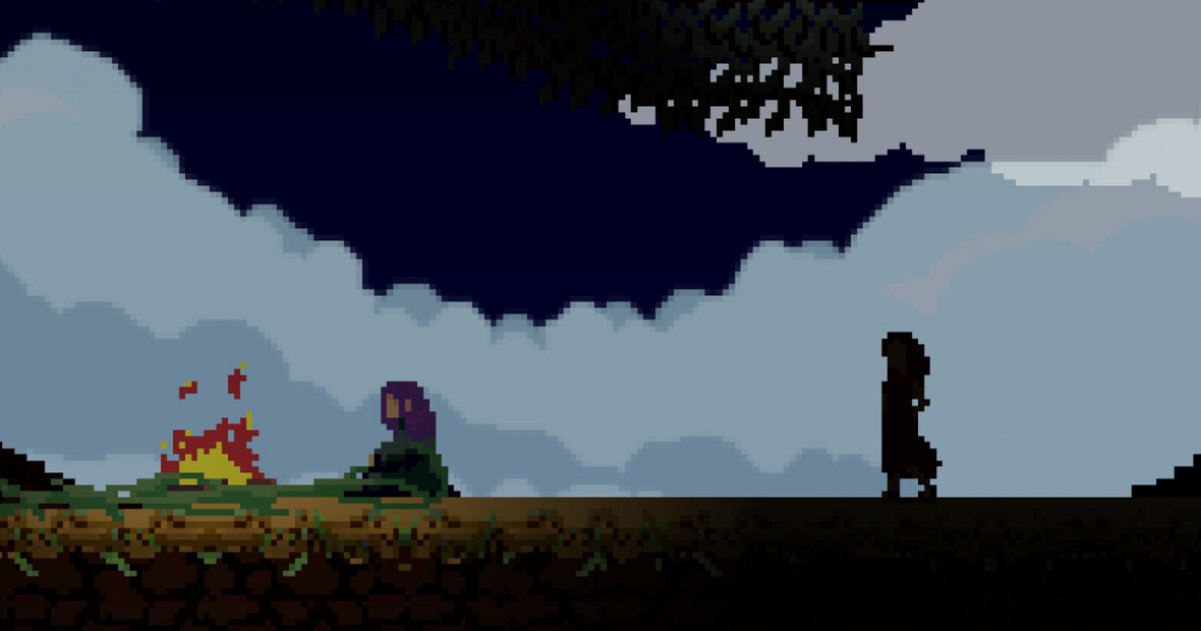
Before the release of Quantum Witch, I was offered an exclusive interview opportunity with NikkiJay. Having escaped a cult, dealt with her trauma, and created a whole game telling her story, I was fascinated by the idea of learning more details — from development to personal life and how it all interconnects into one.
We were careful not to touch on very sensitive topics, as this was a live interview. To this end, and to give NikkiJay the opportunity to talk about her experience, we decided to submit the entire transcript for her to be able to tell her story, of course, with some edits to make it easier to read.
GameGrin:
I’m sorry about the trauma you had with cults, although I think that it’s very brave that you’re facing it. I’d love to learn more about how developing the game has helped you cope with it, especially since Quantum Witch has such a humorous and light vibe to it.
NikkiJay:
Yes, my coping mechanism has always been humour. It’s the only way I could get through a lot of it, which was just making inappropriate jokes. So I wanted to create something that let me do that, and maybe people playing it, that there’s a lot of dark, serious stuff, but it does kind of highlight the absurdity of a lot of it. When you break down what cults do and how they operate… If nobody was hurt, it would be hilarious. There were a few points where I thought, “Yeah, we’re going to make fun of this. And hopefully people will laugh at it and then go, should I be laughing at that? Really?” Yeah, it’s fine. You have my permission. It’s okay. And I got someone who played it come back and say a couple of times, “I thought, ‘I shouldn’t be laughing at that, but it’s really funny.”
It’s, like, a lot of humour does come from tragedy. It comes from pain, and it is a coping mechanism. It’s like when I was going through the worst of it, videogames, Red Dwarf, and Hitchhiker’s Guide to the Galaxy were my escapes. So yeah, anything funny, anything that just went, “Hey, this is completely absurd if you take a step back and look at it for what it is, objectively.” It’s just ridiculous, and it kind of comes off at the end of the game that there’s a certain path you can take, which highlights that everything is absurd, everything is ridiculous, and why do we get hung up over certain things? And… It’s just been a real outlet. It has brought up a lot of uncomfortable memories. And there are a few bits where I’m writing, and I had to take breaks because I had to confront things I hadn’t thought about in a long time; it really helped. It was kind of therapy, in a way.
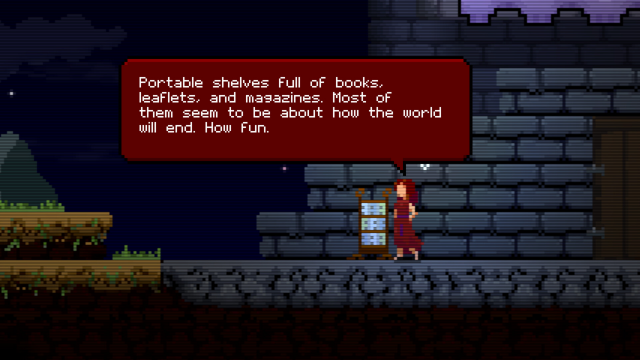
GameGrin:
Were there any unexpected experiences faced while developing the game and while processing the trauma?
NikkiJay:
There was a lot of resentment that came up. One of the things that the game highlights, on a few different levels, is being isolated. It was a huge thing when I was growing up: we were isolated from the rest of the world, while we still lived in society, we weren’t part of it. We weren’t allowed friends, we weren’t allowed to think of anybody outside of the group as good. And that’s there on a fundamental level through the game. It’s like even the main area of the game where Ren lives, in Hus: it seems to be nice, it seems to be all pleasant and wonderful, but it’s always pleasant and wonderful, and that’s a bit suspicious. There are secret areas you can find which highlight how isolated Hus is from everything that’s outside. In the game, it’s presented as a protection for the people in Hus. But you start to wonder, is it really a protection? Is it just hiding away? Are there things out there that maybe you should be exploring? Other people out there to help, which you’re kind of ignoring because you just want to hide away.
I think maybe most people won’t pick up on those themes, apart maybe people who’ve been through similar experiences would, but I didn’t fully realise how deep that theme was until I’d finished writing it and… read it all back and played it all through and went, “Yeah, isolation is really a key point, especially in the early parts if you know what to look for.” And it did bring up a lot of resentment for my family putting me through that.
In the group I was part of, because you weren’t allowed any socialisation outside of the group, if you ever left, they cut you off totally. So, you lost your entire support structure: every friend you’ve had, every family member who was in it, they just acted as if you didn’t exist anymore. So, that’s the situation I found myself in when I was about 18 or 19. Everything came to a head, and [when] I came out, my family had a terribly violent period with various members of my family being violent. I just found myself with literally no one apart from a few friends that I’d made through videogames because I’d taken a Saturday job in a videogame store and started meeting people and bonding over playing Mario Kart together. So, I was very lucky in that I did have a couple of people I could go to and say, “I need help.” But apart from them and sleeping on surfers and trying to find somewhere to live, I was totally alone. But that’s how they keep people in: if you leave, you have nothing.

GameGrin:
That is absolutely beautiful that gaming has actually helped you connect to others, and although it wasn’t the same support system as a family, it must have been a breath of fresh air to have something outside of them.
NikkiJay:
Yeah, it was really an escape. What I loved about videogames is that these curled lumps of plastic could create entire worlds with characters I cared about that I had a connection to. I knew that’s what I wanted to do. That, say, I want to build worlds inside the computer that mean something to people that resonate with their experiences, and I really learned that with Quantum Witch I have done that; I don’t like to bolster my own abilities, but I’ve done that! I sat and watched my wife play through it — she was one of the first play testers — and she said, “I don’t want to play it until it’s complete because I want to experience the full story.” So, as soon as that was done, she played it, and there were two or three times she had to stop because she was crying, and I was like, “What’s wrong?” and she said, “One, I hate that you went through all that.” [I responded,] “Yeah, it wasn’t good.” She said, “But two, Ren is me.” I said, “What do you mean? Cause Ren isn’t you. Ren is part of me, but how do you see you in Ren?” And she said, “Well, Ren is completely messed up. And she’s made decisions that have set things in motion, which are going to destroy the world if she doesn’t stop it. But her family still love her. And that’s me. I mess up so much, but my family still love me.”
And it’s like, these kind of universal insecurities and fears that a lot of us have, especially people with ADHD, autism… who are very sensitive to rejection, who overthink and overanalyse. The main character, even though she is a character in her own right, is a placeholder for the player because it’s the player controlling all of her choices. There is no game, there is no story, there is no plot [without the player]. And so [they] get really attached to the choices they’ve made and the consequences that Ren’s going through because of them. It’s like, yeah, I think I really do have something special here.
GameGrin:
Honestly, I think the Ren is incredibly charismatic, and I absolutely loved her almost off the get-go. So, I can see how it’s going to be very painful to have to actually watch her go through whatever decisions I put her through. This actually pairs perfectly because I was wondering what had decided to make you, as a debut title, open up and show such a vulnerable part of yourself. I was wondering: while making Ren, how you had come up with the character process and all that.
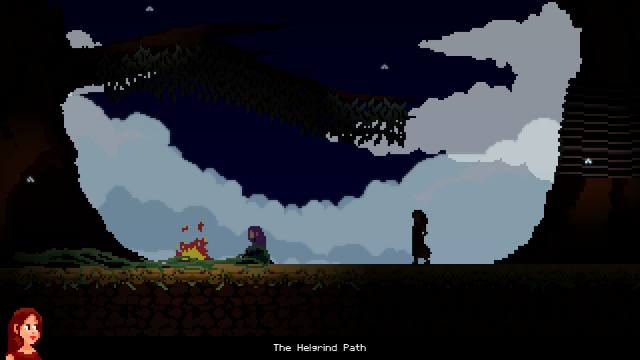
NikkiJay:
Yeah. So there are hundreds of thousands of pixel art platformers, so trying to come up with a new idea for a puzzle mechanic in a platformer… It’s almost impossible. It’s just been done so much. And I think the next evolution for videogames, or one of the next evolutions, is going to be personal storytelling through it. Because those things are truly unique: someone’s experiences might be similar to somebody else’s, but they are unique to that person.
If you’re a good storyteller and you can draw some pixel art, design some levels, and create a world, you can tell infinite stories. And I tried a couple of quirky platformers before, just for my own experiments; they were never going to be anything special. It was just going to be another pixel art platformer. So I wanted to do something that was personal, where the themes of the experiences I went through were really in the game as a fundamental part.
I say to people that it is a platformer kind of in that there are platforms and you jump on them, but it’s not really about that: it’s about the story. It’s not a platformer: It’s a plotformer. Because I would say there are no bad endings and there are no good endings: there are endings where different groups of people get different things. And it’s really up to you as the player to decide if you like that ending or not. And they all come from your choices that you’ve made. And most of the choices the game informs you pretty well what the consequences might be. But there are really three categories of ending.
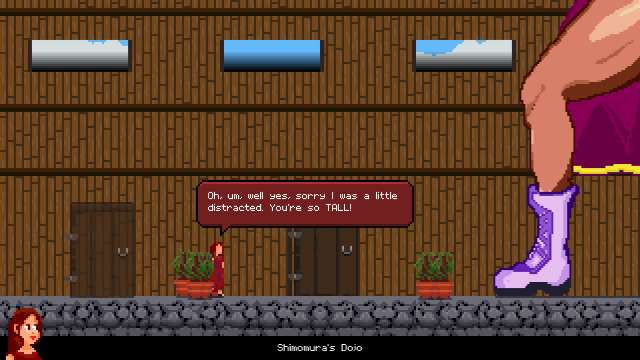
There’s bleak but hopeful. There’s interesting and adventurous. And then there’s “Ren got everything that she wanted”… but because Ren got everything she wanted, did everybody else get everything they wanted? What sacrifices did she have to make for other people to get that ending? There are no good or bad choices; there are just choices, and the player has to decide, “Did I make the right choice?” I really wanted to keep away from the good bad ending; so there are endings.
There’s a character in it called Judgment who is an old god that you meet near the end of the game and he says, “Our choices are stones dropped in the lake and they ripple outwards and those ripples can strengthen others and cancel out others and weaken others still. And we have no idea everything that our choices will touch. It takes a god to see them all.”
GameGrin:
I was wondering as well, now that we’re touching on story, considering that you’re working with Paul Rose, what can you tell me about having a writer work alongside you on a game that is so personal to your story and yourself?
NikkiJay:
So, one of the great things about Paul is that he’s very much, “This is your story, and I’m going to help you get to the story that you want to tell.” His help was really as a mentor because what I’d written were a lot of story beats and character notes… but I had no idea how to actually get [a] complete, congruent, self-contained story. And he helped me so much. He did a script treatment for everything I’d written and put it together as a single story and showed me how to do it.
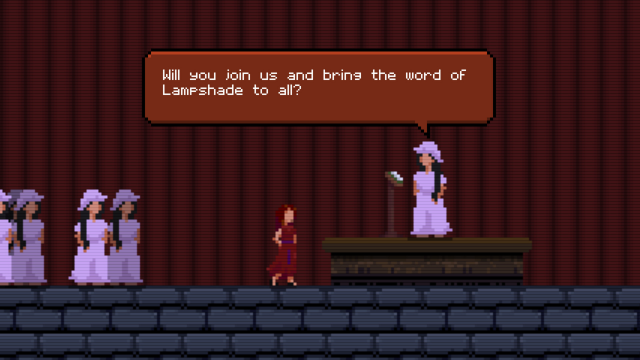
Without his help, it just wouldn’t have happened. It would have been a load of little scenes that made sense on the run, but just weren’t connected. So he was absolutely fantastic getting me to that point where I understood how to create this narrative. And it was even more complex. I really wouldn’t have been able to do it without his help. He’s such a talented writer.
But the thing about Quantum Witch is it’s [not one narrative]: it’s three or four stories that intertwine. You can set off on your first playthrough and make a bunch of choices, and you get your story, and [it stands alone], and you get your ending, and everything makes sense. But there are a lot of unanswered questions, [kind of like], “I want to find out more about this character and this character and why this character acts like this and what this symbol means.” So you play through again, making different choices, and you find out that side of the story. By the time you’ve played through two, maybe three, times, you’ve got a complete picture of what everything is.
But the beauty of it is you can take any path through the game, and it still stands alone as a story that you’ve chosen and got to the end. There are no game overs, there are no choices which are bad and end the game. You carry on until the credits, no matter what choices you make; the game ends when you have your complete story.
So to attempt something like that… yeah, I needed a BAFTA-nominated writer to help me, to guide me through how to do that. Yeah, he was fantastic.
The other writer who worked on it as well, Stephanie Sterling, she loves queer stuff and she loves skeletons. She said on BlueSky that she was open for narrative work. And I thought, I have a character that she would be perfect to write. Absolutely perfect: a type of grandiose, “I am the greatest” personality that she puts on.
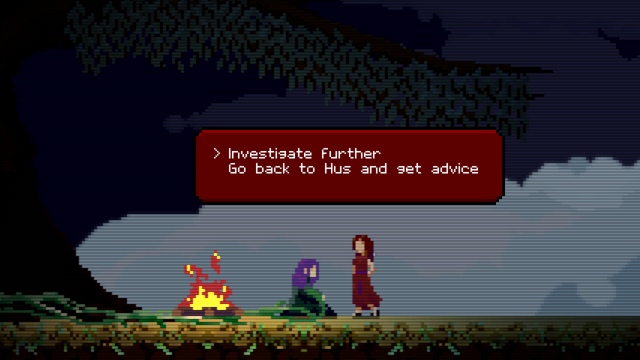
Having spoken to her, outside of her videos, she really isn’t like that in real life, but the characters she can write like that are brilliant. So, I had this character who was an old god. and I said, “Maybe you’d like to write her dialogue, to write her character”, and showed her a video of the skeleton who can see through time who is also queer. And she said, “Indie. Queer. Skeleton… I’m in.”
I asked her to write a few scenes, and she came back a few weeks later with an entire storyline based around these characters, and we looked at it, “Okay, how does this integrate with the game? Is it going to be something [that really stands out] or something that doesn’t fit?” But her religious-based queer trauma had so much overlap with mine that people playing the game kind of don’t realise it’s come from a different writer, that section.
We worked together to integrate it into the deeper law of the world and came up with [bits of law that] I wouldn’t have thought of by myself, but really [fit all the themes just made the world] so much bigger and richer, and she was delighted. She’s fantastic to work with.
This one character, which she wrote as a joke, and I’m like, “No, that’s got a parallel with this other character, which happens in another part of the game that you don’t know about yet, but it’s a perfect parallel.” And she’s like, “My goodness, I just did this as a throwaway character, but now it’s this.”
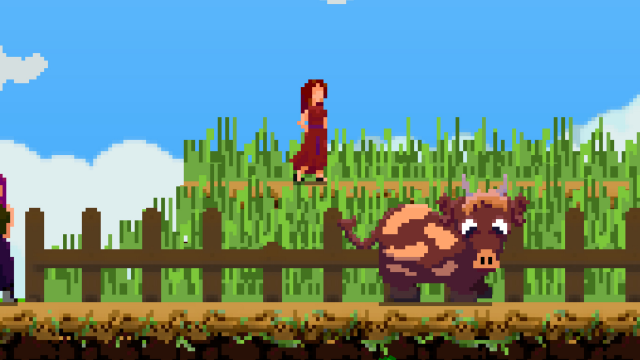
I don’t think it would have worked with anyone who hadn’t been through the same type of experiences because she’s also ADHD, autism, has been through queer religious trauma and there’s so many, kind of, universal experiences for that group of people; it gelled perfectly. So it’s still my story: everything that happens was governed by me… but I wanted those other perspectives to just make it richer.
That’s something I found about being a solo developer, like, all the code is mine and the engine is mine, the world designs are mine, all the art is mine… but as a solo indie developer, you’re not alone. You don’t have to be alone: it’s fine to get other people involved, and you can still say you created this because you’ve directed everything in it. There’s nothing in it that you didn’t want in it and that you didn’t say, “Yes, that absolutely fits and I want that.” That type of collaboration really expands stuff, and that’s something I had to accept was okay for me to do because, again, going through the isolation I went through as a child, it’s like one of the things it installed in me was that I have to be self-sufficient in everything: I have to be able to do everything by myself because I knew I couldn’t depend on anybody else. Everybody else was going to disappear.
So, it was an incredible experience actually opening up this stuff and saying these are all the metaphors in the game, and these are the experiences they represent, and kind of giving somebody else a bit of control to go and write other stuff, and then come back with it was real personal growth. So, yeah, when I say it again was therapy for me. I really do mean it made me grow as a person.
GameGrin:
That is an amazing step that you took because I felt the same, that it must have been really hard growing up and having to depend on yourself, to then give this over to someone else. But I think that adds more beauty to the game because it’s kind of bringing a bunch of people who have struggled like you and your friend, of course, giving voice and showing that we’re not really alone, and that’s absolutely a stunning situation.
NikkiJay:
That’s really what I wanted for it: my kind of goal for it was to find that audience out there who can identify with these characters, and if one person is going through the same thing, plays this, and goes, “You know what? I’m not alone. Somebody else went through this and came out of the other end, and they’re fine, and they made this.” [If] it just gives them a bit of hope that things will be okay… then that’s worth it all.
…and if we get a Netflix animated series as well, that’s fine.
GameGrin:
So my next question is: as someone who isn’t really in touch with her creative side because I’m terrible at even just creative stories, it’s hard for me to grasp how the processing of turning a project into something cathartic works. What sort of insight could you give us non-artists about this?
NikkiJay:
It’s weird to hear anyone describe me as an artist. That’s the thing: I don’t think there are non-artists. I think there are a wide range of expressions and you find the way of expressing it that works for you. Everyone is an artist. If you’ve created something that gets an emotional response or gets a response, that’s art. Videogames are art and art is videogames. Just… yeah. This divide between artist and non-art it just doesn’t exist. If people stop thinking about that and go, “If I’ve created, if I’ve created anything, I’m an artist.”
It’s a process. It’s like before I started Quantum Witch, I couldn’t draw convincing stick people. I took a couple of colour theory courses and pixel art tutorials online and just practiced and practiced and practiced and there was no point at which I stopped being a nonartist and became an artist.
There is a video called… I wish I could remember the full title, “Make It Wiggle”, and it’s about doing your first ever indie pixel art drawings and adding personality to them when you have no previous experience and it’s one of my favourite videos ever because a guy draws this what looks like a terrible little character and then he goes, “There’s that and it doesn’t look right. It looks awful… but if we do this to it…” and he draws it again, not creating a perfect copy but just same character but hand-drawn over the top and then there’s them as an animation and the character starts to wiggle and it’s got personality and you go that’s a character I could play. So, the best thing you ever draw will look terrible. When I draw a new Quantum Witch character, always looks terrible until I kind of sculpt it and give it the personality and the little quirks that make it into a character. It’s just keep making things: that line doesn’t exist; the moment you create something, you’re an artist.
GameGrin:
I want you to know that when I first started up the game, I was absolutely stunned by Ren because I was like, “Wow,” I even told my wife, I was like, “She’s so beautiful.” it’s a pixel art, but she’s so beautiful. And the same thing happened when I met her wife. Particularly when she put on the little flower. I was shocked that the little such a small detail made such a change to her wife; you did a great job with that.
NikkiJay:
Thank you. It’s one of the reasons I like drawing at that low resolution is I’m not great at detail. And so when you’re drawing with such a low resolution, you kind of have to imply that the detail is there. None of the characters have eyes… none of the characters have faces; they’re just kind of blank. But there’s so much around them. And you was able to shape them and give them their own distinct silhouette that people sort of project the detail onto them and it kind of engages the imagination to fill in the detail better than I could draw the detail.
GameGrin:
This is actually very true because when I met the wife, I basically projected my wife into her and I was like, “She’s beautiful. She’s stunning.” Especially with a little flower.
NikkiJay:
So what I’ve done to create the characters like their personalities and their look, is that I’ve taken elements of me and just turned the saturation to maximum and haven’t made them a stereotype, but really emphasised parts of my own personality and extracted them into a separate character. So Ren is kind of like the cute little girly side that I don’t like to admit that I have. ‘Cause I’m an enormous butch lesbian; I’m terrifying. I’m not cute — stop it!
So Ren’s personality: she’s open to all the magic. She’s kind of naive and happy-go-lucky, wants to help, very self-sacrificing. And those are elements that I have, which I’ve just kind of put into her. Tyra, is kind of like… she’s hair and muscle goals. But she’s also sceptical: she doesn’t like, kind of, magical thinking, and she likes to be very grounded, which was a side I had to develop coming out of the cult because in the cult it was all magical, mystical, these forces are watching over us. And I had to develop that side of myself which went, “They really exist? All these things I believed for such a long time… are they really true?” So Tyra is that part of me that doesn’t trust immediately, that wants evidence for everything.
There’s Lev, who’s very scientific, addicted to caffeine. There’s a detail about that I won’t say. He’s not immediately, visibly queer, but there’s a certain secret scene you can unlock where you find his queer history. And the skeleton is just a little chaos goblin, and I love the skeleton.
GameGrin:
I do too; I was chuffed when I met him.
You’ve given me some really interesting insights and trauma processing; I found it very fascinating that after you were done writing the story, you kind of saw the correlations between how you felt in the cult and that isolation in the happy place and I was wondering: you’ve mentioned a lot of difficult parts in the development — the trauma processing, having to open up to others… — so what would you say has been the most challenging aspect of developing Quantum Witch and was it difficult to find the right tone and vibe that you wanted to go with?
NikkiJay:
Originally it started off as just a few short stories… a few scenes I’d written that I wanted to do National Novel Writers November ‘cause I thought, “It’s just words… it’s just writing a story; that’s easy. I can do that!” And a friend was doing it. Yeah, she just made it look so easy. And I tried it and I found… this isn’t easy. I don’t like doing this. It’s like, oh boy, new level of respect for writers achieved. It’s incredibly difficult.
So I thought, I used to do text adventures when I was a kid just to entertain me and my siblings: maybe I should do a point-and-click adventure. [it didn’t work] because it’s so difficult to write one that isn’t incredibly frustrating. [The number of times] I get stuck just using every object with every other object in every location to find the one that the writers thought was correct… I didn’t want to do that. So I thought I wanted this to be purely choice-based, where there are no wrong choices. You can’t get stuck and wonder what choice to make next because every choice you make will move it forward. And there are some parts in the game where not making a choice is also a valid choice and moves the story forward.
Coming to that point took about a year and a half before I could actually sit down and develop the game with the style it is now. The tone of it, I always knew would be very very similar to Hitchhiker’s Guide to the Galaxy. That series of stories starts with the world being destroyed, but it’s hilarious. So I knew from the beginning that is the tone I want. I think that the most difficult part about the whole process has been telling people about it because I’ve always been quite isolated. I don’t have a network. I don’t have anybody to tell about it… And then I had to go to people and say, “I’ve made something brilliant and you should pay attention to it because it’s special.
My upbringing was very much that you’re not allowed to think good about yourself. Anything you make didn’t really come from you; it came from God. So you can’t give yourself credit. So to have to go out and say, I think I’ve got something really special here. That was incredibly difficult.
GameGrin:
Gosh, that I can’t imagine that weird step out of the comfort zone.
NikkiJay:
Yeah. The strange thing is the River Home chapter that Steph Sterling wrote has that as a major theme. And when she brought the script back to me and I read it, I was like, “This is exactly how I feel about telling people about this. The amount of courage it took for me to ping you on BlueSky and say, ‘Look, I’m doing this, and I think it’s worth your time’ was huge. And then you come back and write something which has that exact theme in it.” Yeah, it is incredible. But yeah, I really think that’s the most difficult part for me is accepting that people are calling me an artist. I’ve made art. It’s like, “Oh, really, me?
I’m just hoping that… like, I don’t have huge ambitions for it. I would like to not make a loss because I’ve had to spend a lot. Paul and Steph, I want to pay them fairly. The music was arranged and performed by a friend of mine who priced his services way lower than he should have. So, I wanted to pay him fairly as well. There’s all the time I’ve had to take help from the day job, and all I really want to do is break even and be able to find an audience who think it’s special so I can do a sequel and carry on telling stories. That’s what I love doing and it’s what I’d love to do again.
GameGrin:
There are many references in Quantum Witch to great games and classics. From one passionate gamer who has never made a game in her life to another one who’s about to release her first, did anything shock you or surprise you about game development?
NikkiJay:
So I’ve been writing software since I was about 11. I’m a huge geek and I love software, and it’s what pays the bills for me at the moment (hopefully game development will be in the future). It is so easy to get one thing wrong and for the entire game just to fall apart; It’s incredibly difficult.
We’re trying to run this game engine smoothly on so many variations of hardware and on so many platforms because while I’ve been developing this, I’ve been thinking maybe one day it goes to consoles, I don’t want to have to rewrite it. I’m having to write things that will work on consoles and PC, so I’m having to make sure that the memory management doesn’t mess up and cause stuttering in the game because you can have a smooth 60 frames per second and then if for two seconds it stutters to 10 frames and then recovers, it doesn’t matter that you’ve had half an hour of 60 frames a second smoothness. People remember those couple of seconds when it stuttered because it takes you out of the game completely.
It is incredibly challenging, and when games are released and there are a lot of bugs in them, that’s not good. However, a lot of the time, it’s management pushing for things to be released by a deadline and not giving the developers time to really do things properly. I’ve seen that in so many areas of software development, and I thought, “With all my experience, writing this game engine would be a breeze!”… I was wrong again.
So, I wrote it originally in JavaScript because it was just the language I was using at the time professionally. I thought, “There are other games written in JavaScript which run on the Switch, Xbox, and PlayStation, so it should be fine.” And then I went to the people who’d written games in JavaScript and got them on the Switch, and they said, “No, it’s not fine. Basically, we had to write something custom to get it running on the Switch, and yeah, you’re not going to be able to do a platformer. What you’re trying to do will just not work with the technology you’ve chosen.
So, I decided to take three weeks out from paid work and learn C#. I’d never done that language before, but I knew that Stardew Valley is written in C# and it’s portable to all the consoles. So, I learned it and I came up with a new way of scripting the scenes. So, when you see Ren talking to someone, that’s the code [telling her what to do. When she] faces Tyra and she says a certain thing [your dialogue choice creates a] branch and sets things in motion again to make that have an effect. That’s a language I wrote called Witch Script, which allows me to script a scene like that as if it’s a screenplay in English. So literally it’s like the script will say Ren says, “Hello, Tyra. Look, I found a flower” Tyra faces Ren. Tyra says, “That’s sweet.” Ren says, “Would you wear it in your hair?
And that’s literally what the script looks like. And then the game engine interprets into the C# code and runs it. So, it allows me to create quite complex scenes relatively quickly. And [there have] been a couple of my friends [who have YouTube channels] and they said, “Would you send a few screenshots [so we can] feature them?” I said, “I can do you in a completely custom scene where the characters talk about your YouTube channel if you want.” And they’re like, “Really? Isn’t that like a load of work?” I said, “No, give me 20 minutes to come back later with the video of the characters talking about their YouTube channel.” So yeah, it was definitely worth those three weeks, like learning C# and developing this scripting language.
GameGrin:
Honestly, that’s fascinating. In fact, this makes me bring up another question. I touched on the bad stuff, so which was your favourite part of developing Quantum Witch?
NikkiJay:
My favourite part is probably writing the parts where the characters broke the fourth wall. [There are at least a couple of times] when the characters break character and start making fun of the writer for being a bad writer
GameGrin:
I love it when Ren wakes up and she goes, “A fetch quest is this early in the morning?” It got a laugh out of me
NikkiJay:
Yeah, I mean… how much detail can I give? So there is a character… who has a certain name which gives you a clue as to her nature, and then two of the characters make fun of her name and say that’s a really overused trope, giving characters names that hint at their true nature. And then the characters laugh at the writer for doing that. And then they just snap back into character and carry on with their scene.
Once again, I’d like to thank Nikki for the opportunity! It was a very insightful and emotional interview, and I feel lucky to have been a part of it. Don’t forget to check out her game, Quantum Witch, which you can find on Steam!
